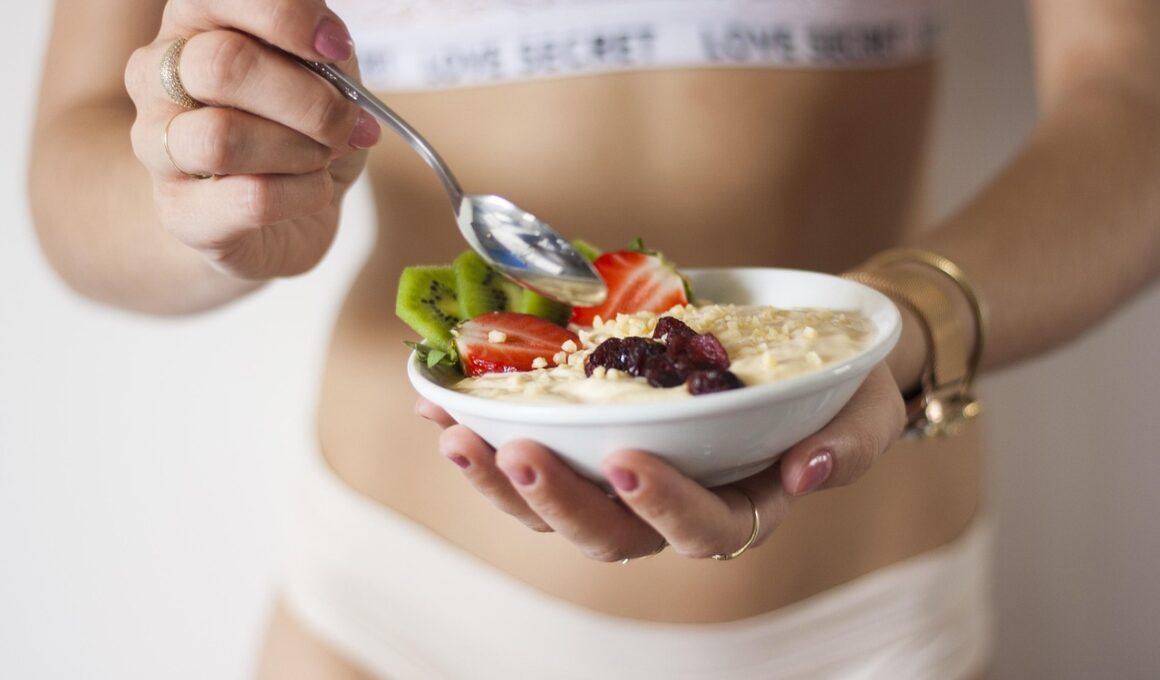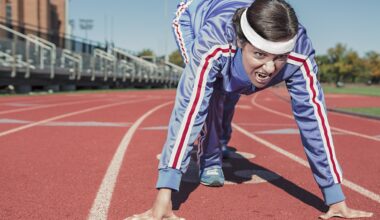Pre-Workout Nutrition Strategies for Maximum Plyometric Performance
Maximizing plyometric performance relies significantly on effective pre-workout nutrition. Athletes must focus on consuming specific nutrients before training sessions or competitions. It’s crucial to have adequate glucose levels within the body to facilitate high-energy output. This can be achieved by ingesting carbohydrates before engaging in plyometric exercises. High-glycemic index foods, such as white rice or sports drinks, provide quick energy, allowing for better performance during explosive movements. Alongside carbohydrates, protein is vital for muscle repair and growth. Therefore, a combination of carbohydrates and protein in pre-workout meals can optimize plyometric training. Also, hydration plays an essential role and should not be overlooked. Proper fluid balance is necessary to avoid fatigue. Aim to drink water or electrolyte-replenishing drinks to maintain hydration levels. Incorporating micronutrients such as vitamins and minerals is equally important for overall performance and recovery. Including foods rich in antioxidants can help reduce inflammation and support recovery between workouts. Furthermore, considering individual dietary needs and preferences adds to meal effectiveness before workouts, ensuring optimal performance during plyometric training.
Timing is another critical aspect of pre-workout nutrition that athletes should not ignore. Consuming a balanced meal approximately 2-3 hours prior to a workout can help optimize performance. This meal should be rich in carbohydrates and moderate in protein, providing sustained energy throughout the workout. For instance, a meal comprising whole grains, lean meats, and vegetables can significantly prepare the body for high-intensity plyometric training. In contrast, those who prefer a lighter option can consider a protein shake or smoothie with fruits or low-fat yogurt, further enhancing energy availability during workouts. Additionally, athletes should avoid high-fat and high-fiber foods before exercising, as these can lead to digestive discomfort and interfere with performance. Close to workout time, having a small snack rich in simple carbs, like a banana or energy bar, can provide immediate energy. However, it is essential to experiment with food choices to discover what works best for each individual. Every athlete’s metabolism and tolerance vary, and finding optimal pre-workout meals may involve some trial and error. Ultimately, proper timing and nutrient composition can greatly influence plyometric performance.
Hydration Strategies for Plyometric Training
In plyometric training, hydration serves as a foundational pillar for athletic performance and recovery. Inadequate hydration can impair muscle function and lead to decreased athletic output during intensive exercises. Athletes should strive to drink water consistently before workouts, particularly in warm weather, to maintain optimal hydration levels. The recommendation is to drink at least 500 milliliters of water two hours before training. Additionally, incorporating electrolyte-rich drinks can be beneficial, especially for prolonged training sessions. During intense plyometric workouts, fluid loss through sweat is significant, and replacing electrolytes is crucial to avoid cramps and fatigue. Sports drinks containing sodium and potassium can enhance hydration and improve performance. Post-workout hydration is also critical; athletes must restore lost fluids to promote recovery and prevent dehydration. Monitoring urine color can serve as an indicator of hydration status; a pale yellow suggests adequate hydration. Implementing a hydration plan tailored to the individual’s specific needs can make a dramatic impact on overall performance and recovery as maintaining consistent hydration supports all forms of physical activity, especially in plyometric exercises.
Protein consumption around training periods is essential for muscle repair and growth, which is particularly crucial for plyometric athletes. Eating protein-rich snacks or meals post-training can significantly support muscle recovery. A ratio of 3:1 carbohydrates to protein post-exercise has been widely accepted as beneficial for the best recovery. Foods like chicken, tuna, or plant-based proteins paired with whole grains can aid muscle recovery after intensive plyometric workouts. On top of this, consuming branched-chain amino acids (BCAAs) offers additional benefits for reducing muscle soreness and enhancing recovery. Some athletes choose to supplement with BCAAs before or after workouts to speed up muscle repair. Timing is still crucial; ideally, athletes should consume protein within a 30-minute window post-exercise to maximize its effectiveness. In addition to protein, pairing it with carbohydrates replenishes glycogen stores depleted during exercise. It is also essential to consider dietary preferences, with many athletes opting for plant-based options without compromising the recovery benefits. Overall, prioritizing protein intake aligned with nutrition strategies fosters optimum plyometric performance and recovery.
Reduce Fatigue with Micronutrients
Micronutrients play an integral role in the overall health and performance of plyometric athletes. Focus on incorporating a variety of vitamins and minerals to combat fatigue, which may otherwise hinder plyometric performance. Antioxidants such as vitamin C and E are vital for reducing oxidative stress and inflammation following intense workouts. Foods rich in these vitamins include berries, nuts, and green leafy vegetables. Additionally, magnesium and potassium are critical for muscle function, preventing cramps during explosive movements. Obtaining these minerals through whole foods such as bananas, sweet potatoes, and spinach should be encouraged. Zinc plays a significant role in immune function and recovery. Athletes can benefit by ensuring enough intake through animal protein sources or legumes. Furthermore, B-vitamins are essential for energy production and can be acquired from grains, eggs, and dairy. When athletes prioritize a balanced diet full of varied food sources, they lay the foundation for improved plyometric performance. Regularly consuming nutrient-dense foods supports both immediate and long-term performance goals. Ultimately, embracing a holistic approach to nutrition encompasses adequate macronutrients and micronutrients, benefiting athletic resilience.
The psychological aspect of pre-workout nutrition should also be emphasized. Athletes often face stress before engaging in high-intensity plyometric sessions. Engaging in proper nutrition leads to greater confidence and focus during workouts. Knowing they have fueled their bodies with the right nutrients reassures athletes, allowing them to concentrate more on form and function. Athletes can further enhance their mental state through preparatory rituals such as meal planning. Creating a structured plan around meals alleviates anxiety regarding food choices, particularly right before workouts. Journaling, mindfulness exercises, or even participating in visualization techniques aid in mental preparation leading up to training. Additionally, nutrition also influences mood, making it essential to choose nutrient-packed foods that stabilize blood sugar levels. Snack options like nuts and fruits serve this purpose well, preventing crashes that could deter athletic performance. A supportive environment, including coaches and teammates, reinforces a healthy focus on nutrition, emphasizing the importance of this factor in performance enhancement. The interplay of mental focus and sound nutrition builds a stronger athlete ready to tackle plyometric demands head-on through every training session.
Conclusion: The Impact of Nutrition on Athletic Performance
In conclusion, effective pre-workout nutrition strategies play a pivotal role in maximizing plyometric performance. By focusing on carbohydrates, proteins, hydration, and micronutrients, athletes can enhance their training results significantly. Each component interlinks to support energy, recovery, and overall health. Establishing meal timing strategies, ensuring an appropriate balance of nutrients, and developing a personalized nutrition plan ensures that athletes meet their unique needs, allowing for peak performance in demanding plyometric exercises. Additionally, acknowledging the role of psychological nourishment through mental focus can transform the workout experience. As athletes continue to evolve in their training methods, adaptability in nutrition practices should remain a priority. Ultimately, nutrition provides the foundation for any athlete, fueling their pursuit of excellence in plyometric training and performance. Emphasizing the importance of these strategies nurtures not just physical capability but mental endurance, creating a comprehensive approach to athletic success. With consistency and commitment to a well-rounded diet, athletes empower their bodies and minds, leading the way to optimal performance in plyometric activities and beyond.


